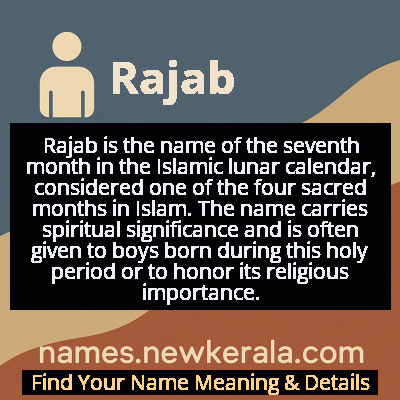Rajab Name Meaning & Details
Origin, Popularity, Numerology Analysis & Name Meaning of Rajab
Discover the origin, meaning, and cultural significance of the name RAJAB. Delve into its historical roots and explore the lasting impact it has had on communities and traditions.
Name
Rajab
Gender
Male
Origin
Muslim
Lucky Number
5
Meaning of the Name - Rajab
Rajab is the name of the seventh month in the Islamic lunar calendar, considered one of the four sacred months in Islam. The name carries spiritual significance and is often given to boys born during this holy period or to honor its religious importance.
Rajab - Complete Numerology Analysis
Your Numerology Number
Based on Pythagorean Numerology System
Ruling Planet
Mercury
Positive Nature
Adventurous, dynamic, curious, and social.
Negative Traits
Restless, impatient, inconsistent, prone to indulgence.
Lucky Colours
Green, white.
Lucky Days
Wednesday.
Lucky Stones
Emerald.
Harmony Numbers
1, 3, 9.
Best Suited Professions
Sales, marketing, travel, entertainment.
What People Like About You
Versatility, charisma, adventurous spirit.
Famous People Named Rajab
Rajab Ali
Islamic Scholar
Renowned Pakistani Islamic scholar and author of numerous religious texts
Rajab Tayyip Erdoğan
Politician
Turkish politician named after his father Recep Tayyip Erdoğan, involved in political affairs
Rajab Suleiman
Military Leader
Ottoman military commander known for his role in various campaigns
Rajab al-Bursi
Islamic Scholar
Prominent Shia scholar and mystic known for his spiritual writings
Name Variations & International Equivalents
Click on blue names to explore their detailed meanings. Gray names with will be available soon.
Cultural & Historical Significance
Throughout Islamic history, Rajab has been a time for increased devotion, optional fasting, and spiritual preparation. Many Muslim communities traditionally begin their spiritual preparations for Ramadan during Rajab, making it a month of anticipation and spiritual renewal. The naming of children after this month reflects the deep connection Muslim families feel to their religious calendar and the desire to imbue their children's identities with sacred temporal significance. The practice demonstrates how Islamic culture intertwines personal identity with communal religious observance.
Extended Personality Analysis
Individuals named Rajab are often perceived as spiritually inclined, thoughtful, and possessing a natural sense of dignity. The name's connection to one of Islam's sacred months tends to imbue bearers with a sense of responsibility and moral consciousness. They are typically seen as patient individuals who approach life with contemplation and wisdom, much like the reflective nature of the sacred month itself.
Many Rajabs demonstrate leadership qualities combined with humility, often serving as moral compasses in their communities. They tend to value tradition while maintaining progressive outlooks, balancing respect for heritage with modern sensibilities. Their personality often reflects the transitional nature of Rajab month - preparing for greater spiritual achievements while maintaining current responsibilities with grace and dedication. Family and community members often expect bearers of this name to exhibit higher moral standards and spiritual awareness, which frequently becomes a self-fulfilling prophecy as the individuals grow into their namesake.
Modern Usage & Popularity
In contemporary times, Rajab remains a popular name among Muslim communities worldwide, particularly in Arabic-speaking countries, Turkey, South Asia, and Southeast Asia. While not among the most common names, it maintains steady usage among families who wish to honor Islamic traditions and calendar significance. The name has seen consistent popularity without significant spikes or declines, reflecting its status as a traditional rather than trendy choice. In recent years, there's been a slight increase in usage among diaspora communities seeking to maintain cultural and religious connections while living in non-Muslim majority countries. Modern bearers often appreciate the name for its deep spiritual connotations while finding it distinctive enough to stand out in multicultural settings without being overly unusual.
Symbolic & Spiritual Meanings
Symbolically, Rajab represents spiritual preparation, sacred time, and divine connection. The name evokes the concept of transition and anticipation - much like the month itself serves as a bridge between ordinary time and the heightened spirituality of Ramadan. It symbolizes respect for tradition, moral boundaries, and the cyclical nature of spiritual growth. Metaphorically, Rajab signifies a 'sacred space' in time, reminding bearers and others of the importance of designated periods for reflection and devotion. The name carries connotations of purity, as the sacred months were traditionally times when warfare was prohibited, representing peace and spiritual focus. It also symbolizes the journey of faith, echoing the Prophet's miraculous night journey that occurred during this month, thus representing ascension and divine connection.

